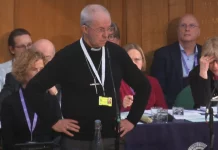In its breathless report on Argentina’s new President in its January issue, Evangelicals Now manages to sound not unlike the BBC.
EN reported on the Church Mission Society’s reaction to Javier Milei’s election victory in November, describing him as ‘far right’: ‘The Church Mission Society (CMS), which absorbed the South American Mission Society (SAMS) in 2009, has responded to the election of far-right populist outsider Javier Milei as the new President of Argentina.’
The BBC in a November news report described Milei in exactly the same terms: ‘Argentines have elected far-right outsider Javier Milei, 53, as their new president. With almost all votes counted, Mr Milei had won close to 56% in the decisive run-off, ahead of his left-wing rival, Sergio Massa, with 44%. The radical newcomer’s victory has been described as “a political earthquake”.’
The quote from CMS’s ‘spokesperson’ Naomi Steinberg in EN’s report, to whom the paper said it had spoken ‘exclusively’, was quite anodyne and did not accuse Milei of being an extremist: ‘From a mission point of view, we can see that the political, economic and environmental situation in Argentina is precarious and needs much prayer. Our people in mission in the region are praying that the new President will be surrounded by a leadership team that is wise, compassionate and full of integrity.’
But the paper’s own comments in its ‘World News report’ certainly gave the impression that Milei is an extremist: ‘Sometimes dubbed “El Loco” (the madman) by his critics, Milei has promised drastic changes, which include ditching the local currency, the peso, for the US dollar and “blowing up” the central bank in order to prevent it from printing more money, which he argues is driving inflation. He has also proposed cutting welfare payments and slashing bureaucracy by closing the ministries of culture, women, health and education, among others. Public works would be “cut down to zero”. On social issues, he wants to loosen gun laws, abolish abortion – which was legalised in Argentina in 2020 – and allow the sale and purchase of human organs.’
Abolishing abortion? Is that a far-right extremist position? Many millions in Britain before abortion became legal in 1967 by a Private Member’s Bill in Parliament would surely not have regarded their country as ‘far-right extremist’ because killing unborn children by the hundreds of thousands per annum was illegal.
Fortunately, EN does not appear to have shifted from its conservative doctrinal stance on primary issues of faith and morals, so I do not plan to cancel my subscription (despite the sloppy journalism in this particular report, the paper has not actually come out in favour of abortion). Secular politics is a secondary issue on which Christians can legitimately differ, though with national elections due in 2024 in the US and the UK EN could turn itself into a force for division in evangelicalism if it continues to parrot the BBC line on political issues.
For what it is worth, I happen to be in favour of re-nationalising the UK rail companies and re-creating British Rail, whose pungent cheese and pickle sandwiches I remember fondly in the cigarette-smoke-filled buffet car when as a school boy I used to travel on the London to Cambridge line in the early 1970s.
Dear EN, Given that the Labour government elected in 1997 did not reverse the Conservatives’ privatisation of the rail network, does my nostalgia for British Rail make me a far-left extremist?
Julian Mann is a former Church of England vicar, now an evangelical journalist based in the UK.










